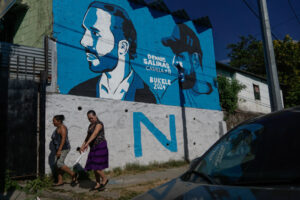In March 2012, authorities in El Salvador facilitated a truce between the country’s two largest street gangs, MS-13 and 18th Street. To many observers’ surprise, the truce has now lasted for more than a year. Homicide rates began to drop immediately after the truce was announced, and the reduction in murders has been sustained throughout the year. At the same time, there are concerns about the lack of transparency in the planning and implementation of the truce and what kinds of agreements may have been made with criminal groups; there are also questions about its long-term sustainability. Observers have noted that although there has been a dramatic decrease in homicides, rates of extortion and other crimes that negatively affect large numbers of citizens have continued. Notwithstanding these concerns, the dramatic drop in homicides may provide an opportunity to implement comprehensive violence prevention and reintegration programs for Salvadoran youth in high-risk communities.
The panelists focused on the political context and implications of the truce, what role the church or actors within the church have played either in launching or sustaining the truce, and what opportunities the truce may provide for implementing long-term programs that respond to the needs of those communities most affected by violence. The discussion, held on March 29, 2013, also drew on experiences with gang truces in the United States and other contexts.

